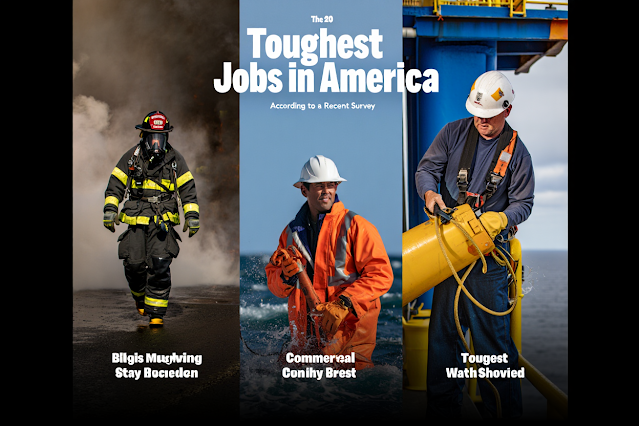A new survey by StudyFinds reveals the most demanding jobs in the U.S., based on physical, mental, and emotional challenges. Polling 2,000 Americans, the study highlights occupations that test resilience, stamina, and grit. Here’s the list of the top 20 toughest jobs, along with key insights into what makes them so grueling.
Top 20 Toughest Jobs
- Firefighter
- Why it’s tough: Risking life in extreme conditions, battling blazes, and rescuing people under intense pressure. Long shifts and emotional toll add to the strain.
- Surgeon
- Why it’s tough: High-stakes decisions, long hours in surgery, and immense responsibility for patient lives. Precision and focus are non-negotiable.
- Police Officer
- Why it’s tough: Facing danger daily, managing volatile situations, and coping with public scrutiny. Shift work disrupts personal life.
- ER Nurse
- Why it’s tough: Fast-paced, high-pressure environments with life-or-death cases. Emotional exhaustion from patient suffering is common.
- Construction Worker
- Why it’s tough: Physically demanding labor in all weather, with risks of injury from heavy machinery or falls. Long hours on-site.
- Military Personnel
- Why it’s tough: Combat risks, prolonged deployments, and strict discipline. Mental health challenges like PTSD are prevalent.
- Oil Rig Worker
- Why it’s tough: Harsh offshore conditions, long shifts, and isolation. High injury rates are due to heavy equipment and remote locations.
- Teacher
- Why it’s tough: Managing classrooms, addressing diverse student needs, and navigating bureaucracy. Emotional labor and low pay add stress.
- Paramedic
- Why it’s tough: Rapid response to emergencies, performing under pressure, and witnessing trauma. Irregular hours disrupt work-life balance.
- Commercial Fisherman
- Why it’s tough: Dangerous ocean conditions, long hours, and physical exhaustion. High risk of accidents or drowning.
- Air Traffic Controller
- Why it’s tough: Intense focus to manage air traffic safely. High stress from preventing collisions and handling emergencies.
- Roofer
- Why it’s tough: Physically taxing work at heights, exposed to weather extremes. Falls and injuries are constant risks.
- Social Worker
- Why it’s tough: Emotionally draining cases, heavy caseloads, and limited resources. Burnout is common from supporting vulnerable people.
- Truck Driver
- Why it’s tough: Long hours on the road, isolation, and tight delivery schedules. Health issues from prolonged sitting and irregular sleep.
- Farmer
- Why it’s tough: Physically demanding, weather-dependent work with unpredictable income. Long hours and financial stress are ongoing.
- Electrician
- Why it’s tough: Risk of electrocution, physically demanding tasks, and work in confined or hazardous spaces. Precision is critical.
- Public Defender
- Why it’s tough: High-pressure caseloads, defending clients with limited resources, and the emotional weight of justice system outcomes.
- Mental Health Counselor
- Why it’s tough: Absorbing clients’ trauma, managing crises, and preventing burnout. Emotional resilience is essential.
- Waste Management Worker
- Why it’s tough: Physically grueling, exposure to hazardous materials, and early hours. Social stigma adds to the challenge.
- Lineworker (Utility)
- Why it’s tough: High-risk work on power lines, often in storms or extreme weather. Physical demands and long hours are standard.
Key Insights
- Diverse challenges: The list spans physical (e.g., construction), mental (e.g., air traffic controller), and emotional (e.g., social worker) demands, showing no single type of “tough.”
- Risk and sacrifice: Jobs like firefighters and military personnel top the list due to life-threatening conditions and public service.
- Undervalued roles: Teachers and social workers rank high despite lower pay, reflecting their emotional and societal burdens.
- Health impacts: Many jobs involve long-term risks like injury (roofers), mental health strain (counselors), or chronic fatigue (truck drivers).
Survey Methodology
StudyFinds surveyed 2,000 U.S. adults, asking them to rank jobs based on perceived difficulty, factoring in physical effort, mental stress, danger, and emotional toll. Responses were weighted to create the final list, with data cross-referenced from industry reports and occupational studies.
StudyFinds surveyed 2,000 U.S. adults, asking them to rank jobs based on perceived difficulty, factoring in physical effort, mental stress, danger, and emotional toll. Responses were weighted to create the final list, with data cross-referenced from industry reports and occupational studies.
These jobs are essential to society, yet many are underappreciated or underpaid. The survey sheds light on the resilience required and sparks discussion about better support, from safer conditions to fair wages. Recognizing these challenges can foster greater respect for workers in these roles.
From firefighters facing flames to teachers shaping futures, America’s toughest jobs demand extraordinary effort. The survey underscores the need to value and support those who keep the country running, often at great personal cost. For more details, visit StudyFinds’ full report.


